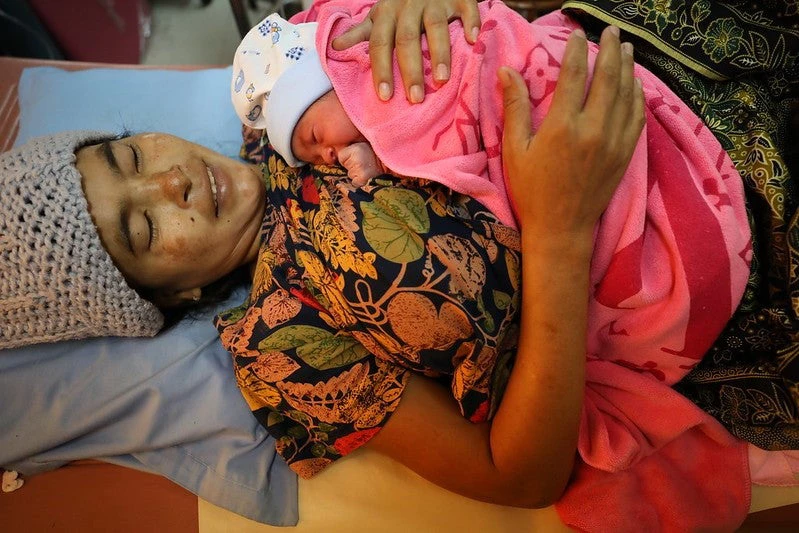 A mother holds her new-born son in the maternity ward of the Phnom Penh Municipal Hospital.
A mother holds her new-born son in the maternity ward of the Phnom Penh Municipal Hospital.
Cambodia has made great strides in recent years, both in terms of economic growth and key health indicators like life expectancy and infant, child and maternal mortality rates. The country reached lower-middle income status in 2015 and was advancing steadily toward Universal Health Coverage (UHC) with significant improvements of its health services.
However, just as Cambodia had begun to grapple with health system challenges including disparities in health outcomes and access to services depending on location, gender and the decrease in development assistance – a feature of its economic advancement – those problems were being compounded by a much larger one – COVID-19.
The pandemic threatens to not only disrupt the provision of essential services in Cambodia but also to offset some of the progress made in delivering health care in recent years. A study by the Global Financing Facility found that under-five mortality could increase by 35% and maternal mortality by 50% in 2020 if essential maternal and child health services were badly affected.
COVID-19 also severely jolted the economy, with potentially dire consequences for public financing for health. The tourism, manufacturing for export, and construction sectors, which contributed more than 70% of growth and almost 40% of paid employment in 2019, were hit hardest by the pandemic. This will likely result in a plunge in tax revenues, significantly reducing domestic budget resources available for health in the short- and medium-term.
HFSA to the assistance
To understand what Cambodia could do to mitigate the impact of the pandemic and get back on track to achieving universal health coverage in these difficult circumstances, the World Bank and the Australian government conducted a systematic assessment of the country’s health financing system. The study, called the Cambodia Health Financing System Assessment (HFSA), is being carried out under the Advance UHC Multi-Donor Trust Fund and seeks to provide an in-depth assessment of critical interventions covering maternal, neonatal, and child health designed to close equity gaps due to gender inequality, income disparities, and remoteness.
The Cambodia HFSA also assesses the potential impact of COVID-19 on health financing and service delivery and it identifies priority areas where reforms of health service delivery and financing systems could accelerate progress toward universal health coverage.
Among the key recommendations:
Investing in health and nutrition could pay dividends by developing human capital
Continued investment in health and nutrition is a priority. Improving maternal and child nutrition, addressing emerging challenges such as noncommunicable diseases, and providing equitable access to quality health care could be of critical benefit to national development. However, the expected drop in revenue linked to the pandemic means Cambodia is likely to need to increase its budget for health to accelerate and sustain progress toward achieving universal health coverage. Financing needs to expand the coverage in 2020–2023 are estimated at US$2.9 billion, the assessment found.
Increase efficiency and equity in public spending to reach underserved populations
The health system is still hampered by inefficiency and inequity. Resources are concentrated in urban areas and in hospital and primary care services; while rural areas, where maternal mortality rates are highest, remain underfunded. These needs should help guide health resources allocation. Increasing funding for primary care services will help promote preventative services in frontline health facilities and in communities. Providing reliable and equitable high-quality health and nutrition services, and better managing service delivery, should be priorities.
Enhancing financial protection could lower beneficiary costs
Just 30% of Cambodia’s 15.5 million people are currently covered by social health insurance schemes. The Health Equity Fund (HEF) and National Social Security Fund (NSSF), the main providers, account for just a small fraction of total health expenditure, while out-of-pocket household spending accounts for the lion’s share at over 60%. This exposes households to the risk of catastrophic spending, a major cause of impoverishment. Extending social health protection schemes under NSSF to include dependents and under HEF to cover vulnerable populations, such as persons with disabilities and the elderly would mitigate these risks and provide a safety net. In addition, making sure that HEF beneficiaries understand their entitlements and know how to access them could promote higher utilization of the HEF benefits.
Preparing for greater domestic funding of health programs will help sustain key coverage
As Cambodia’s economy grows, the country should prepare for a smooth transition to a greater reliance on domestic budget resources for sustaining essential health programs. Cambodia has responded quickly to the changing fiscal environment and integrated coverage of HIV and tuberculosis for poor families, which had relied heavily on external assistance, into the government-financed HEF program.
Addressing gender gaps will expand coverage
Cambodia ranks medium-low equality in human development indicator achievements between males and females. Women lag behind men in decision-making positions but are more likely to be on the frontline as caregivers both in the hospital and at home, putting them at greater risk of contracting the virus. Closing gender gaps will help improve the health and well-being of its entire population. Thus, planning and policies are necessary to reduce the shortage and maldistribution of health professionals by gender and geographical location, particularly in rural areas, to ensure equal access and quality health services to all.
Cambodia faces a number of important policy choices that can strengthen its development strategy and speed its advance toward universal health coverage even as it faces the challenge of COVID-19. The right choices will help the country strengthen its health financing system and respond effectively to the pandemic.




Join the Conversation